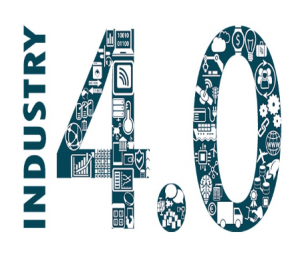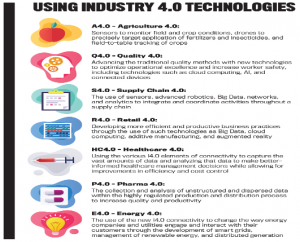The rate of technology change is the defining characteristic of our generation. Its impact on work, labor, how people live, and our social and political interactions, have all been and are being transformed by the digital revolution. This change is likely to be a net good for the world.
 The impact of this revolution on Africa and other developing countries is likely to be even more seismic.
The impact of this revolution on Africa and other developing countries is likely to be even more seismic.
Rapidly evolving technologies and the astronomical proliferation of smartphones across Africa have already changed lives on the continent and increased aspirations, but are also altering the development pathways available to these countries.
In recent years, the ICT sector in Africa has continued to grow, a trend that is likely to continue. Of late, mobile phone technologies and services have generated 1.7 million direct jobs (both formal and informal), contributed to $144 billion of economic value (8.5% of GDP of Sub-Saharan Africa), and contributed $ 1.5 billion to the public sector through taxation.
Digitization has also resolved information asymmetry problems in the financial system and labor market, thus increasing efficiency, certainty, and security in the environment where information flow is critical for economic growth and job creation. The 4th Industrial Revolution is set to transform Africa.
Among the African nations headlining the Industry 4.0 movement in Ghana. Key to this development is the fact that the government of Ghana acknowledged that the adoption of ICT is mandatory for sustainable economic growth. But, to transform Ghana into a high income economy that is rich in information, knowledge and skilled manpower, it needs to make strong strides, steered by ground-breaking technological investments.
In the wake of the COVID-19 pandemic, the government of Ghana partnered with Ascend Digital Solutions, whose aim is to build technology and services-driven platforms that leverage Africa’s diverse and abundant human resources and collaborate with them to prepare them for digital transformation. Ascend Digital Solutions helped the Ghana Government launch the COVID-19 mobile application tracker for Ghana.
The app aims to help Ghanaians and foreigners living in the country to stay informed and safe drawing on advanced capabilities, like geofencing. Following an extensive campaign branded “You Matter”, the app gained significant traction among mobile users, sensitizing them to its benefits in protecting their social circles and personal well-being.
They again introduced the Ghana Rural Telephony and Digital inclusion project being implemented by the Ghana Investment Fund for Electronic Communications (GIFEC) which functions under Ghana’s Ministry of Communications. This project is in collaboration with MTN, Vodaphone, AirtelTigo, Huawei, and the Export-import Bank of China, which aims to commission over 2,000 rural strategic sites. It’s part of the government’s initiatives to reduce the country’s digital divide and promote equal opportunities among its citizens.
In Nigeria, while much might not have been achieved in the core ICT sector, especially in Hardware and software sub-sectors, the telecoms sector could be said to have done a bit better, though still bedevilled with challenges. The telecoms sector’s worth is currently put at over $70 billion, owing to the notable contributions of firms including MTN, Globacom, Airtel, and 9Mobile.
In Nigeria, the trade sector accounted for about 14% of her GDP in 2018. This trend is expected to increase with the greater application of these technologies. Digital platforms like Jumia, Konga, Alibaba, Amazon, and freelancing sites like Upwork and Fiverr are becoming more popular since they lower transaction costs involved in the search process and connect buyers and sellers directly.
The adoption and impact of Industry 4.0 in South Africa are still relatively muted, compared to the rest of the world, with its biggest challenge being education, connectivity, electricity, and accessibility say Gideon Smith (automation and machine building solutions provider S4 Integration marketing manager).
However, there is general reluctance from government and industry to invest in new technologies for broader adoption. The current economic environment is forcing South African Manufacturers to save costs first and spend less on innovation.
In Zambia, it’s another story, as pressure on the government to provide employment, provide policies and regulations, and conducive support exists in enterprises.
Furthermore, employment meant a larger tax base revenue authorities that could be used to enhance and upgrade the various social and economic amenities. For businesses to be effective, there need to be driving forces that make it easy to conduct businesses in the country. And one of them is the application of Information and Communication technology which is good for conducting business among SMEs and their trade.
But most SMEs would not adopt e-commerce if the benefits do not outweigh the costs of developing and maintaining the system. SMEs were generally concerned about the costs of establishing and maintaining e-commerce since they generally suffered from budget constraints and were less sure of the expected returns on the investment.
WHY INDUSTRY 4.0 IS STILL ESSENTIAL FOR OUR REBOUND STRATEGY AFTER THE PANDEMIC
The benefits of the Industrial Revolutions were tremendous! The improvements led to higher standards of living which brought about a longer life expectancy, as a result of enhanced food production, better housing, and increased access to clothing and consumer goods due to reduced prices. This is similar to the current pandemic which has resulted in profound change. In these crises, we need to work towards developing structures that work for the economy in the presence or absence of a crisis.
Hence, leading companies heavily invest in strategies that ensure the right skills and mindset. This could involve, for example, leveraging a blend of centres of expertise to develop new digital skills and digital academies to up-skill all employees.
Automation of systems is one of the strategies for staying in business and a launching pad for a rebound. This is because if embraced, it shall enable continuity and provide a platform to further make businesses resilient, both in the medium and long terms.
To stay competitive, this is the best time for manufacturers to embrace the 4th Industrial Revolution. How we respond to the crisis will ultimately demonstrate our resilience. We are forced to rethink our operations, including swiftly embracing technological investments in our value chain- from raw materials to finished products. This automation will enable us to enjoy the benefits of Industry 4.0 more, which include increased efficiency, enhanced productivity, flexibility, cost reduction, innovation, higher revenues, and eventually, increased profitability.

We must make bold decisions to survive this pandemic and unseen circumstances and rebound thereafter. This means a more concerted and widespread move to automate as much of operations as possible and employ efficient technologies to optimize production and minimize losses.
It would be critical to promote policies that uptake digitization in the country, in 2018 Kenya Association of Manufacturers and Overseas Development Institute developed a ten-point policy agenda for a successful digital transformation of Kenyan Manufacturing titled, “How to grow to manufacture and create jobs in a digital economy: 10 policy priorities for Kenya.”
This Kenyan policy plan addresses issues related to building digital infrastructure including increasing access to digital services and updating policies on data, boosting the competitiveness of Kenyan manufacturing in an increasingly digitalized economy, and managing the digital change inclusively and sustainably.
The pandemic should inspire us to strongly consider and hasten our taking up of industry 4.0. Digital workflows and automation should no longer be goals but requirements. Only the most astute businesses will take advantage of industry 4.0’s full potential.



